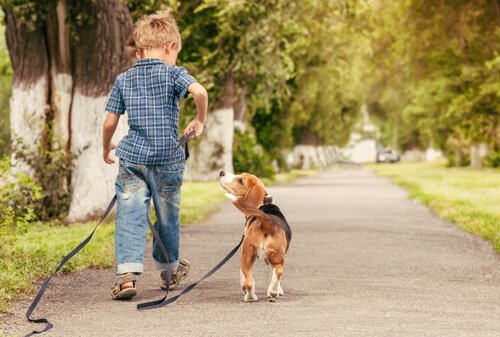Family-Friendly Dog Breeds


Written and verified by the lawyer Francisco María García
If you have or are planning to have kids, it’s important to know which dog breeds are best for children before choosing a family pet. If you get a relaxed and family-friendly dog, you’ll feel more secure about having him around your kids.
While any dog could be a perfect match for your family, these family-friendly dog breeds could be great options. Our list is based on statistical data from studies on which breeds interact best with children.
From wolves to dogs
Thousands of years ago, wolves began to cozy up to humans to get refuge and warmth from fires. The two species had a mutually beneficial partnership, as humans used dogs to hunt, protect their families and keep them company. These fierce wolves became domesticated and more docile over time, and became more like the dogs we know today.
This progressive transformation allowed humans to distinguish between the characters of specific dogs, and breed together ones that had desirable traits. Due to their breeding and natural temperament, some dogs are better at hunting while others are best at protecting children.

Domesticated dogs consider their owners to be leaders of their dog packs, and show an impressive level of loyalty to their families. Dogs have taken care of children for millennia — there’s even a long history of dogs guarding royal children.
Why are some breeds better with children than others?
There are no breeds that are always “perfect” or “terrible” with children. A dog from any breed could get along great with your family but suffer when living with another family. You should think about what traits you want in a family-friendly dog, and decide on a breed based on that.
The most important factor when choosing a family-friendly dog is how adaptable they are to children’s hyperactivity and curiosity. Your dog should also be obedient, affectionate and a quick learner, so intelligent dogs might do better in this environment.
A breed’s size might not be an important factor, as size doesn’t determine a dog’s behavior — a Yorkshire Terrier might scare a Great Dane if he barks loud enough. Dogs that are usually good-natured, like the Cocker Spaniel, also might not make great family dogs.
Conduct and socialization
A dog’s behavior is 50% determined by breed or lineage and 50% by his experiences and training. For this reason, every dog needs to be trained and properly socialized — this is to teach him to live peacefully with people and other animals.
Another thing to keep in mind is to find a dog breed that’s easy to train and socialize. Playfulness and energy levels should also be considered. Dogs that need lots of backyard space and multiple hours of exercise per day might not be comfortable in your home and family routine. Some breeds also require lots of grooming or special care.
Make sure to begin to train and socialize your dog within his first 20 weeks, so this becomes ingrained behavior.
What are the most family-friendly dog breeds?
Below is a list of dog breeds that are most suitable for families with children, according to scientific evidence from studies:
1. German Shepherd
German Shepards are the second most intelligent dog breed and are great family dogs. They learn quickly, are easy to train and love playing with children. German Shepards tend to keep a protective eye on children, as if the kids were their own puppies. Although they require daily exercise, these dogs have been around since the Middle Ages as family companions.
2. Boxer
Boxers’ kind and affectionate character, strength, intelligence and physical resistance make them excellent guard dogs for children. They are very sweet and dedicated companions. They have a high energy level so they do need daily exercise and a big backyard due to their medium size.
3. Poodle
Poodles are the most intelligent dogs in the world and can learn lots of tricks. They’re easy to care for, although they require daily brushing and regular haircuts. Poodles come in all sizes, from toy to giant, so you can get a Poodle that best fits into your home. They are characteristically playful, obedient, faithful and loving. Poodles love water but also tend to be homebodies.
4. Beagle
Beagles are friendly, active dogs that are usually small to medium sized. They like to play with kids and can entertain children for hours, and they need daily walks.
5. Labrador Retriever
Labrador Retrievers are a classic family-friendly dog breed. They’re intelligent, affectionate, faithful and patient. They learn easily and obey commands quickly, and typically have high energy levels.
6. Golden Retriever
Golden Retrievers are relatives of Labrador Retrievers and, like Labs, Golden Retrievers are intelligent, loyal and relaxed. They learn and obey commands easily. They are less hyperactive than Labs, but require more grooming for their fur, which regularly sheds.
7. Collie
As we saw in the classic film “Lassie”, Collies are intelligent dogs, with a very pleasant and obedient character. They adapt well to either the countryside or the city. Collies are a great option for owners who prefer bigger and more protective dogs. They require space, exercise and regular grooming, and they love playing and being pampered. Collies are super popular family dogs worldwide, because of how gentle they are with children.
8. Mixed-breed
Lots of people forget to consider mixed breeds because we are used to choosing a pet from dog breeds — but a mixed breed dog could be a great fit for your family! The vast majority are affectionate, faithful and adaptable. At home, they’re grateful and playful pets. Your dog’s size will depend on which breeds his parents are.

The most suitable dog breeds for children are, in short, dogs whose natural disposition tends toward coexistence, affection and obedience. It’s important to evaluate what you’re looking for in a pet and how the breed’s temperatment will fit into your home life and family. Always remember that if the dog you pick happens to not work well with your family, it’s not the animal’s fault and is more about a mismatch in expectations and needs.
If you have or are planning to have kids, it’s important to know which dog breeds are best for children before choosing a family pet. If you get a relaxed and family-friendly dog, you’ll feel more secure about having him around your kids.
While any dog could be a perfect match for your family, these family-friendly dog breeds could be great options. Our list is based on statistical data from studies on which breeds interact best with children.
From wolves to dogs
Thousands of years ago, wolves began to cozy up to humans to get refuge and warmth from fires. The two species had a mutually beneficial partnership, as humans used dogs to hunt, protect their families and keep them company. These fierce wolves became domesticated and more docile over time, and became more like the dogs we know today.
This progressive transformation allowed humans to distinguish between the characters of specific dogs, and breed together ones that had desirable traits. Due to their breeding and natural temperament, some dogs are better at hunting while others are best at protecting children.

Domesticated dogs consider their owners to be leaders of their dog packs, and show an impressive level of loyalty to their families. Dogs have taken care of children for millennia — there’s even a long history of dogs guarding royal children.
Why are some breeds better with children than others?
There are no breeds that are always “perfect” or “terrible” with children. A dog from any breed could get along great with your family but suffer when living with another family. You should think about what traits you want in a family-friendly dog, and decide on a breed based on that.
The most important factor when choosing a family-friendly dog is how adaptable they are to children’s hyperactivity and curiosity. Your dog should also be obedient, affectionate and a quick learner, so intelligent dogs might do better in this environment.
A breed’s size might not be an important factor, as size doesn’t determine a dog’s behavior — a Yorkshire Terrier might scare a Great Dane if he barks loud enough. Dogs that are usually good-natured, like the Cocker Spaniel, also might not make great family dogs.
Conduct and socialization
A dog’s behavior is 50% determined by breed or lineage and 50% by his experiences and training. For this reason, every dog needs to be trained and properly socialized — this is to teach him to live peacefully with people and other animals.
Another thing to keep in mind is to find a dog breed that’s easy to train and socialize. Playfulness and energy levels should also be considered. Dogs that need lots of backyard space and multiple hours of exercise per day might not be comfortable in your home and family routine. Some breeds also require lots of grooming or special care.
Make sure to begin to train and socialize your dog within his first 20 weeks, so this becomes ingrained behavior.
What are the most family-friendly dog breeds?
Below is a list of dog breeds that are most suitable for families with children, according to scientific evidence from studies:
1. German Shepherd
German Shepards are the second most intelligent dog breed and are great family dogs. They learn quickly, are easy to train and love playing with children. German Shepards tend to keep a protective eye on children, as if the kids were their own puppies. Although they require daily exercise, these dogs have been around since the Middle Ages as family companions.
2. Boxer
Boxers’ kind and affectionate character, strength, intelligence and physical resistance make them excellent guard dogs for children. They are very sweet and dedicated companions. They have a high energy level so they do need daily exercise and a big backyard due to their medium size.
3. Poodle
Poodles are the most intelligent dogs in the world and can learn lots of tricks. They’re easy to care for, although they require daily brushing and regular haircuts. Poodles come in all sizes, from toy to giant, so you can get a Poodle that best fits into your home. They are characteristically playful, obedient, faithful and loving. Poodles love water but also tend to be homebodies.
4. Beagle
Beagles are friendly, active dogs that are usually small to medium sized. They like to play with kids and can entertain children for hours, and they need daily walks.
5. Labrador Retriever
Labrador Retrievers are a classic family-friendly dog breed. They’re intelligent, affectionate, faithful and patient. They learn easily and obey commands quickly, and typically have high energy levels.
6. Golden Retriever
Golden Retrievers are relatives of Labrador Retrievers and, like Labs, Golden Retrievers are intelligent, loyal and relaxed. They learn and obey commands easily. They are less hyperactive than Labs, but require more grooming for their fur, which regularly sheds.
7. Collie
As we saw in the classic film “Lassie”, Collies are intelligent dogs, with a very pleasant and obedient character. They adapt well to either the countryside or the city. Collies are a great option for owners who prefer bigger and more protective dogs. They require space, exercise and regular grooming, and they love playing and being pampered. Collies are super popular family dogs worldwide, because of how gentle they are with children.
8. Mixed-breed
Lots of people forget to consider mixed breeds because we are used to choosing a pet from dog breeds — but a mixed breed dog could be a great fit for your family! The vast majority are affectionate, faithful and adaptable. At home, they’re grateful and playful pets. Your dog’s size will depend on which breeds his parents are.

The most suitable dog breeds for children are, in short, dogs whose natural disposition tends toward coexistence, affection and obedience. It’s important to evaluate what you’re looking for in a pet and how the breed’s temperatment will fit into your home life and family. Always remember that if the dog you pick happens to not work well with your family, it’s not the animal’s fault and is more about a mismatch in expectations and needs.
All cited sources were thoroughly reviewed by our team to ensure their quality, reliability, currency, and validity. The bibliography of this article was considered reliable and of academic or scientific accuracy.
- Pongrácz, P., Molnár, C., & Miklósi, Á. (2010). Barking in family dogs: An ethological approach. Veterinary Journal. https://doi.org/10.1016/j.tvjl.2008.12.010
- Burgoyne, L., Dowling, L., Fitzgerald, A., Connolly, M., Browne, J. P., & Perry, I. J. (2014). Parents’ perspectives on the value of assistance dogs for children with autism spectrum disorder: A cross-sectional study. BMJ Open. https://doi.org/10.1136/bmjopen-2014-004786
This text is provided for informational purposes only and does not replace consultation with a professional. If in doubt, consult your specialist.








